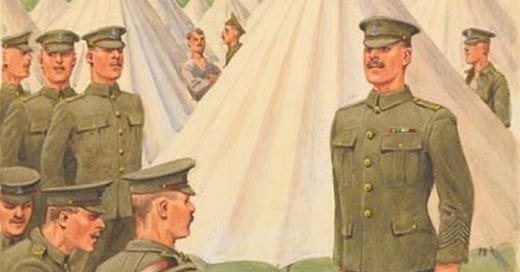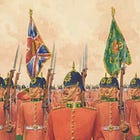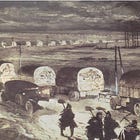This post continues the serialization of Battalion Organization, an article, published in 1912, in the Journal of the Royal United Service Institution, that argued for the replacement of the traditional eight-company battalion with a unit made up of four much larger companies. A copy of the original article can be found here, at the Military Learning Library.
Links to earlier posts in this series can be found below:
The Big Company at Work
Having established these fine big companies, and provided them with a logical chain of command from major to corporal, we must see to it that the company commanders of the future be given a free hand to train their units on their own lines throughout the year, under the personal supervision of the commanding officer. At present, a captain may be said to command his full company during only one month, after which it dwindles away, and loses cohesion during eleven months. No individual is to blame for this unfortunate state of affairs, wish is the outcome of a battalion system instituted many years ago for a totally different set of conditions. To illustrate the working of this system, let us take a concrete example from every-day life.
Officers must have winter leave, and NCOs and men furloughs, all of which are at present arranged for in the battalion orderly room. But under our new organization nothing should be settled by the battalion commander which could be better left to the discretion of the company commander. Thus the officers’ leave, and the men’s furloughs could be worked in and out so as to interfere as little as possible with winter training. No one but the company commander is in position to arrange these matters to the general convenience of all ranks and the consequent efficiency of the service.
Then again, section training, now neglected in home battalions, could become a feature of the winter work, when the subaltern would take charge of his section at full strength, and learn to instruct it in elementary subjects. He would consequently be inure fitted than he is to instruct and command men. Moreover, he would be always dealing with the same men, instead of being shifted about from company to company as is unavoidable with eight companies kept permanently short of four subalterns, on the present peace establishment. I know of no individual more capable of rising to the occasion than the British subaltern when he is given a real job to do, but under present conditions, he has few opportunities of showing his value
The little company as we know it is a “one-man” show, and if it happens to be commanded by an exceptionally able captain, the result is wonderful, considering his difficulties. He makes superhuman efforts, and grapples daily with the inconvenience of our faulty organization, but the same energy might well be devoted to a better cause. Yet how often have we seen such company fall to pieces as soon as its exceptional commander leaves it. Big companies, on the other hand, will depend for their efficiency not only on a good major and first-rate captain, but also on the quality of our section commanders; and the battalion C.O. [commanding officer] will be afforded a real opportunity of judging the merits of his subordinates, and forming an opinion as to their fitness for promotion.
Increased Responsibilities Involve Increased Powers
If the commander of the enlarged company is to produce a really good result, he must no longer be treated like a child. Men are made or marred by the treatment meted out to them by their superiors. Under existing regulations, majors commanding companies, that is to say, men of upwards of 15 years’ service, are not trusted to appoint a private to lance-corporal, or even to reduce an inefficient lance-corporal to the ranks. We must therefore, postulate for increased powers of reward and punishment if our majors and captains are to command and train companies of 220 men, and convert them into a fighting machine. This applies with particular force to battalions serving abroad, and completed to war strength.
With these increased powers, it stands to reason that either the major or the captain must always be available for duty with the company—not any major or any captain, but the major or the captain of the company. This means that majors must in future be promptly seconded on appointment to the staff, and necessitates the speeding-up of the machinery of promotion, especially in battalions abroad. Perhaps the electric telegraph might come into more general use for this purpose.
The series continues with:
For Further Reading:
To Subscribe, Support, or Share:















“commander of the enlarged company is to produce a really good result, he must no longer be treated like a child.”
Only truly noble middle aged men can endure the terrors of letting younger and junior men make decisions. Fighting and danger are fine, decisions have career consequences.
Typically during deployments the Company Commander’s powers of administration, promotion, Article 15, UCMJ and even tactical matters and combat are pulled up 2 or more echelons. This is done for careerist motives by those who can smell a star, or another star. Yes acutely in war, war is the Supreme OER, and we can’t let those young bunglers screw up the career path.
At GOFO there are no OERs, there are however boards, meaning Lockheed and Boeing, L3, Halliburton.
"Under existing regulations, majors...are not trusted to appoint a private to lance-corporal, or even to reduce an inefficient lance-corporal to the ranks. We must therefore, postulate for increased powers of reward and punishment if our majors and captains are to command and train companies of 220 men."
I begin to comprehend what changes are actually being argued for. Eight essentially independent companies in which everything is micromanaged by officers/NCOs who don't have any real authority and are often called away by other duties, vs. four companies and an expanded HQ allowing for clearer delegation of responsibility and more consistency in post, but also more C2 capacity for the centre. Gotcha.